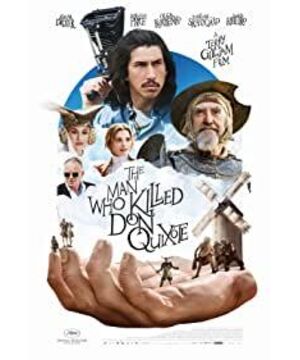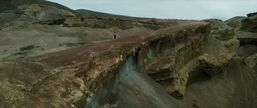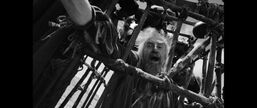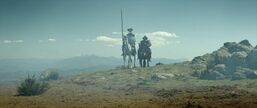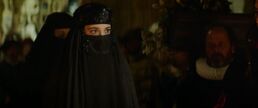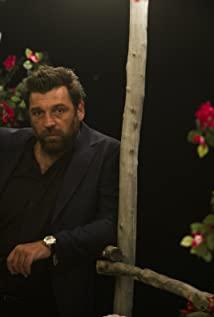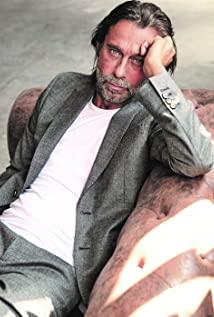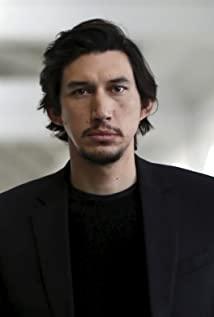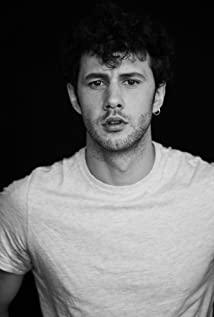The great director Terry Gilliam, who is well-known for his "wonderful imagination," filming a film with Don Quixote as the theme is really a "match made in heaven", and it is natural for movie fans to look forward to it. The finished product did not disappoint. "Who Killed Don Quixote" inherited Gilliam's usual style and ambitions, with both the heaviness of reality and the joy of not being mad and not alive.
Gilliam did not directly tell Don Quixote, but borrowed a story from a director who made a Don Quixote movie to express the motif of "Don Quixote". As a result, Don Quixote, the film's director, and Gilliam are conspicuously linked together, and interact in the film as a prototype, theme, and creator. The final presentation, of course, is the attitude of the creator Gilliam. His "Don Quixote" is his ideal and love for movies as a director.
Toby, the director in the film, is not the complete incarnation of Gilliam. He is a character in the contradiction between reality and ideals. Through his behavior, especially his transformation, he realizes Gilliam’s understanding of reality and self. expression.
The opening scene of the film is a scene where Toby is shooting a classic scene of Don Quixote and the windmill, and this is also the scene that best reflects the spirit of Don Quixote. But this scene got stuck during filming. It was a technical error to get stuck, but it was director Toby who really got stuck. After following his wishes and mobilizing people to come to Spain to film his "Don Quixote", Toby became less and less feeling.
Toby is now a star director. Bosses, agents, staff and even women (of course, there are audiences who are too late to participate), all regard it as sweet steamed buns. If the filming is done smoothly, all parties will be satisfied, and the director himself will be the one who is struggling. Toby still has ideals, but after becoming a star and staying in the "comfort zone", he now has no inspiration.
But the inspiration soon has a clue.
The boss asked Toby to look at the disc to "look for inspiration". Unexpectedly, at the hawker selling the disc, Toby discovered the school-era work that made him famous in the past, and it is also a film about Don Quixote-"Who Killed Don Quixote.
The hawker who sells the discs is a gypsy who appears many times in the film with different identities and different ways. He is a functional rather than a narrative character, like a clown in the field, helping the protagonist to move forward at critical moments to complete his mission.
Toby's eagerness to watch his own movie was interrupted by the boss's girlfriend's pleas and the boss's unexpected later. This is also a manifestation of ideals being hindered by reality. Fortunately, the affair was not immediately discovered by the boss, and the filming location was nearby. Toby can revisit the old place, which may inspire some creative inspiration.
In ten years, things are wrong. Some of the locals who participated in Toby's film performances died, some disappeared, and some went crazy... While Toby was chasing his dreams, he also gave these people hope to break the reality. But still the old saying, hope is good, reality is cruel. Not everyone can become a "star". If you lose your original self in the process of chasing your dreams, it may be a bit outweighed by the gains.
Toby soon met the famous "Don Quixote"-the poor old shoemaker Javier who once played Don Quixote and now thinks he is Don Quixote. Why did Javier become crazy like this? It can be interpreted from three aspects. First, it is the most basic, and also from a realistic and rational point of view, in order to play the protagonist of the movie, the old man must force himself to become Don Quixote, and the result is too deep to be able to come out of the movie. Second, compared with the ordinary life of a shoemaker day after day, Don Quixote’s adventures and madness have their own splendor, although this is a road to chaos. Third, and most importantly, he is an important symbol of the film, a "Don Quixote" in reality, an existence that is different from reality, and a lost identity of Toby.
Don Quixote of Havel was also the endorsement of Toby at the time. When Toby, who had been eroded by reality, encountered "Don Quixote" again, he could neither wake up nor devote himself, and could only become "Sancho" by the side of "Don Quixote".
Sancho is realistic and sober. Sancho knows the reality as well as the ideal. He is unable to chase the ideal himself, but for the true brave, he will offer help within his power, instead of being indifferent or greedy like others. So Sancho became Don Quixote's partner.
When Don Quixote meets Sancho, the adventure begins.
Soon they met the person who made the adventure purposeful and meaningful-Don Quixote's goddess-"Dulcinea". Angelika, who once played Dursinea, is not doing well now. After the actor's dream was shattered, she became the "pet" of a Russian tycoon.
For Toby, compared to Javier Anjelica, he has a better chance and wants to save. Not only is Angelica's life influenced by Toby, but the heroine he personally identified is, to a certain extent, his goddess, the muse of art, and the driving force of ideals.
In the course of the adventure, there is another episode worth mentioning. "Don Quixote" was injured by the battle windmill and was rescued by a woman. They were taken to a settlement of illegal immigrants. In Toby's opinion, illegal immigrants are terrorists and scare him, but they are actually ordinary and unfortunate people, just like the pagans in the period of Don Quixote, who were driven and arrested.
This passage has little to do with the theme of the film, but it caters to realistic issues, and is not abrupt in the film. But Gilliam himself had a section of Toby calling to arrange group performances in the opening scene of the film to take care of various groups of people, and now he also has a section of political correctness, which is a bit ironic.
Back to the topic, saving Angelika from the Russian tycoon is also the final climax of the film. The Russian tycoon has also become Don Quixote's nemesis-the "magic".
The Russian tycoon showed his "magic", and the makeup party he organized became a stage for "Don Quixote" to struggle. Not only did he take away the goddess, but his status as a tycoon and his exaggerated manners also represented business and entertainment in reality, and he was the greatest enemy of ideals and art.
"Don Quixote" died without defeating the "Magic". But Havel's death does not represent the disillusionment of ideals, but can be seen as a dedication. Magicians are not easily destroyed, and so is Don Quixote. Although moths fight the fire, their spirit of chasing ideals is also manifested, which is remembered and inherited by later generations.
Finally, the sad Toby was also transformed into "Don Quixote" (correspondingly, Angelica also became Sancho). With this adventure, Toby, who changed from Don Quixote to Sancho, became Don Quixote again. Becoming Don Quixote is not irony, not being lost in reality, but fighting for ideals. It is hard to chase ideals, and it is impossible to survive without madness.
The above is the main content of Gilliam's "Who Killed Don Quixote". In terms of form, memories, dreams, makeup evenings, etc. are interspersed through the main story, and the reality is combined to embark on an adventure on a gorgeous stage full of imagination. On the subject, Gilliam, as a director, expressed his exclamation and persistence in pursuing ideals in a realistic environment. For "Don Quixote", conflict seems inevitable, either due to reality or ideal...
(Welcome to pay attention to the personal public number "Wednesday Noise" noiwed!)
View more about The Man Who Killed Don Quixote reviews


